
Seven Students with Backgrounds Underrepresented in the Scientific Diving Community Share their Experiences at the USC Wrigley Marine Science Center
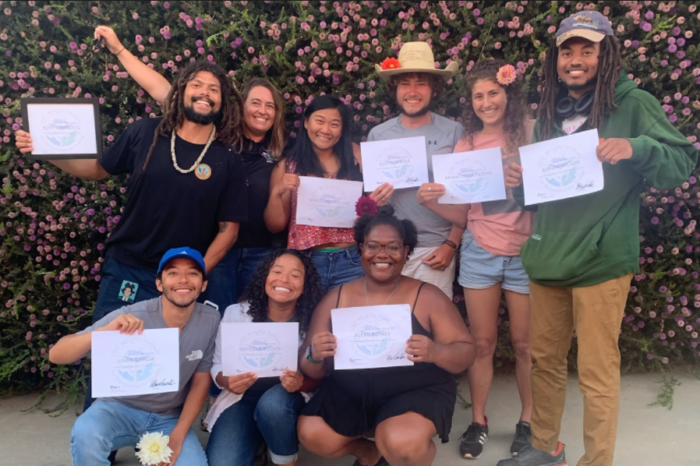
Image courtesy of Yannick Peterhans/USC Wrigley Institute
University of Southern California (USC) faculty and staff, including Professor of Biological Sciences and Environmental Studies Dr. John Heidelberg, USC Wrigley Institute for Environmental Studies Executive Director Dr. Jessica Dutton, and Dive Safety Officer Hanna Reed, created an American Academy of Underwater Sciences (AAUS) dive training program for students from backgrounds that are underrepresented in the scientific diving community. The goal of the program was to prioritize recruiting and retaining diverse students in marine science fields by utilizing the resources available through the Philip K. Wrigley Marine Science Center, a field laboratory on Santa Catalina Island operated by the USC Wrigley Institute for Environmental Studies. The program specifically addressed barriers to entry and retention for underrepresented students in the SCUBA-based, science, technology, engineering, and math (STEM) workforce pipeline including access to swim and dive training, the financial burden of expensive equipment, and a lack of mentoring and networking opportunities. Supported by an Ocean Exploration Education Mini-Grant from NOAA Ocean Exploration and the National Marine Sanctuary Foundation, the cohort of seven underrepresented students gained training for careers in ocean science and scientific diving as AAUS certified divers. Hear from each of the students as they describe the lessons they learned during their three-week program at the USC Wrigley Institute.
Collin Hebner
“My name is Collin and for 3 weeks I lived on Catalina Island at the Wrigley Institute as part of a diving discovery program run by USC. This program started out by giving us a stipend to acquire an open water diving certification as well as to purchase some gear and travel to California. Then we all flew or drove out to Los Angeles where we boarded a boat to come to Catalina Island. From day one we all realized that we were all going to be good friends and there was an immediate sense of comradery and comfort amongst the group. Then our program started the next day. We were immediately tossed into a whirlwind of scuba diving, lectures, and e-learning every day. We were getting in the water at least two or three times every day which was awesome. The goal of this program was to let all seven of us get our recreational advanced open water certificate which would allow us to dive up to 130 feet in depth, and our AAUS scientific diving certification which would allow us to do science under water to depths up to 40 feet. During the program we also had the opportunity to get our California boaters license which was very cool. Overall the program was an amazing opportunity that I am very grateful for and I hope it will be able to be done again in the future so that other undergrads like me are able to have this experience.”
Adrian Wilson
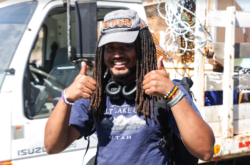
Image courtesy of Yannick Peterhans/USC Wrigley Institute
“Greetings, my name is Adrian Wilson and I am a fourth year Political Science / Environmental Science student at Florida A&M University. Before we dive into this discussion, I would like to preface this by saying that I am NOT a swimmer. I have been to the beach maybe five times in my life and the deepest that I have been in the ocean is waist deep. I didn’t grow up near the beach at all. I mostly grew up in or near forests and mountains. I say this all to say that I am a “land lover”. My hobbies range from backpacking, rock climbing, and camping, so this was completely out of my element. Despite this, the USC Wrigley Scientific Diving course has been phenomenal! I have enjoyed it so much, but also learned more than I thought about myself and those around me. This course has meant a lot to me and given me amazing experiences. I took this course because I wanted to challenge myself in an unfamiliar territory (the ocean). I was never taught how to swim as a kid or even now as a young man. I like putting myself in uncomfortable positions and testing what I am capable of. I was always terrified of the ocean. This acknowledgment and understanding of my fear made me want to tackle it head on though. We started out with “Swim Test Practice” for the 400 meter swim for about two days and it allowed me to feel more comfortable in the water, but I was not prepared for how cold the Pacific Ocean was. I practiced for a couple of days and got better at swimming, but I still could not complete the swim test within the required 12 minutes. I harnessed all the energy in my body and pushed myself one last time on the second day. I thought about the things I had been through in life, all the adversity, all the achievements, all the goals I wanted to obtain, and pushed like a freight train on the tracks. Before I knew it, I had finished my 400 meters in about 10 minutes and I was ecstatic with joy and excitement. Like everything else in my life, I continued and put my best foot forward. I did more swimming in three weeks than I have in my entire life. This course has allowed me to not only enhance my swimming skills tenfold, but also given me the opportunity to be around people who are great swimmers that have taught me a lot.”
Livan Garcia
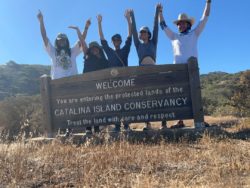
Image courtesy of Yannick Peterhans/USC Wrigley Institute
“This experience has made me feel confident in my ability to take on multiple tasks and has connected me with some incredible people. I did not expect to bond with my cohort as much as I did and to be able to call them friends. I had some amazing teachers who taught me so much about research, networking, resume building, and especially scuba diving. Along with my newfound friends, I learned valuable skills that are required to become a scientific diver and let me just say, it was a lot of skills. Each day there was something new to learn and multiple tasks to complete. I was having too much fun to slow down and feel tired. I’ll forever remember running to lecture or the dive deck as a team and cracking jokes all the way down the hill. I don’t think I would have taken as much as I did from this program if it wasn’t for the people I now call friends. We helped each other at every turn and picked each other up when one of us was down. I knew we were a great team when we could all be paired up with a different member of the group and felt safe to go dive. We always communicated everything to each other and never put anyone in a position that made them uncomfortable. We pushed each other but never to a point that would be dangerous. We took whatever task that was handed to us seriously but found a way to always have fun with it. At the end of each day we would hang out in my dorm room and practice what we learned or did our homework. I can’t even imagine how my experience here would have been if it weren’t for these amazing people.”
Ariana Della Catena
“This was my first experience ever scuba diving, and I feel so grateful and lucky to have joined this program. At first I was nervous, uncomfortable, and dreading submerging into the water, to the point where I was having anxiety and becoming sick in my open water training. However, the instructors Hanna and Kory, as well as the rest of the team, transformed my diving abilities in a short three weeks. Now I enjoy being in the water and swim more comfortably. I went on so many dives, and learned a variety of new skills, that now I am comfortable navigating, finding buoyancy, and laying transects. My favorite dive I went on was our night dive where I saw millions of plankton lighting up the ocean surface. It looked like an epic painting of a starry night sky and was an experience I will never forget. Not only will I receive an Advanced Open Water diving certification, but I am also receiving a first aid, boat, and scientific diving certification. This program has opened up many marine jobs and internships and has challenged me and helped me grow in ways I never thought possible. Thank you for this opportunity, and I am excited to see where the rest of my Wrigley friends will venture on their life journey.”
Alexis Putney
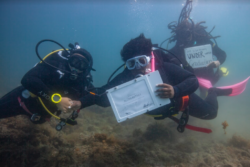
Image courtesy of Yannick Peterhans/USC Wrigley Institute
“Through this experience I’ve learned so many things about myself. I was able to build confidence and reassurance. As a black woman in marine science, sometimes I can find myself as a minority or outcast. Through this program I was able to see that I shouldn’t doubt that I can still build my way up in the marine science community. I see that there are other people like me in marine science, and they work just as hard as me. I feel like after experiencing this I will be able to speak to other people of color and explain to them they are capable. You can create networking just by meeting anybody. One program or experience can open so many opportunities for you. I found peace daily through scuba diving and working with my cohort. This experience led me to meet an amazing group of people – people who are just like me who sometimes don’t know what they might be doing in the future. Together we made a team and worked through everything. Not only did I work hard to get this certification with these six people, I made lifelong friends. Many skills were required to get advanced and scientific scuba certifications. I had to learn how to properly assemble and disassemble scuba gear, how to take my weight belt off in case of emergency, and do scientific things like using a transect and slate. My favorite dive during this experience was one of our deeper 60 foot dives. I wore glasses and wasn’t able to see most of the marine life we were swimming with until the program provided me with perception goggles! I could see spiny lobsters, California sheephead, garibaldi, and so many other things. The most challenging thing I accomplished was keeping my buoyancy under control. Buoyancy is very important in the scuba diving world so being able to control neutral buoyancy and not floating all over the ocean was an amazing thing to accomplish. I also enjoyed the community. It was nice taking a 45 minute walk to two harbors and seeing that lifestyle. Living on the East Coast, the environment is completely different. I truly enjoyed this program, and I hope other people can experience this same opportunity.”
Marcela Riddick
“Seeing the infamous Catalina Bison was on the top of the to-do list of the six soon-to-be American Academy of Underwater Sciences (AAUS ) and National Association of Underwater Instructors (NAUI) Advanced scuba divers that I met on the Miss Christi boat on a beautiful Monday morning. In daily debriefs we would often go through our highs, lows, and buffalos – what went well, what didn’t go as well, and what was a random thing we discovered or saw that made our day unique. Nothing beats the high of learning how to become an underwater astronaut. I’ve spent my whole life with my heart in the sea, and being able to explore our ocean world through scuba was something I had always wanted to do. As an adventurer and activist, using scuba to appreciate the marine ecosystem both scientifically and spiritually has been priceless. I can’t wait to dive for both the betterment of our planet and for fun to connect with people around the world.
My low for this journey has been physical and emotional exhaustion. Approximately 18 dives over the course of 3 weeks, spontaneous hikes around Pimu’gna (Santa Catalina Island), running up and down the USC Wrigley Campus, all while emanating the joy and excitement that comes from learning something new with supportive people around you. Beyond tired – but my heart is full.
My buffalo was connecting with my dive team. Encompassing diversity in thought, origin, values, and beliefs we all came together to learn about a world we didn’t know existed. Through all of the highs and lows, we supported each other and built a community that I did not know was possible in three weeks. Even though we weren’t able to find the Catalina Bison, we all found parts of ourselves in each other. This program was such an unforgettable and unique experience which will be the start of the next generation of divers that will help make the scuba industry and the planet a more inclusive place.”
Marceline San Luis
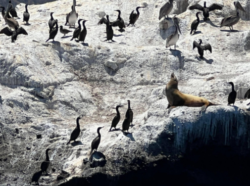
Image courtesy of Yannick Peterhans/USC Wrigley Institute
“Massive thank you to our boating instructors Trevor Oudin and Juan Aguilar! Make way for newly certified motor boat operators! For a few days, Trevor and Juan taught us how to safely prepare ourselves before getting into the boat and vroom-ing away. From learning how to check our radios and filling out float plans, to actually using the motor boat and tying cleat hitches, we found ourselves wanting to operate boats even more in the future. For an adventure after getting certified, we went to Bird Rock to check out the source of the “delightful” smells we’ve been sniffing back at Wrigley Institute. We circled around Bird Rock and saw colonies of cormorants, pelicans, and some seals basking in the sun. Honestly, operating a boat with friends made the experience even more fun because we all knew what we were doing and could enjoy the surrounding ecosystem. I value the boat and scuba training we went through due to the cohesive teamwork, ab workouts (aka laughter), and multitude of learning moments. As a first-generation student and the oldest daughter in my family, I had obligations and expectations that kept me from pursuing what I wanted for myself. The younger version of myself would be so proud, in awe, and inspired by what I have accomplished now during my time at USC Wrigley.”
NOAA Ocean Exploration and the National Marine Sanctuary Foundation launched the Ocean Exploration Education mini-grants in 2021 to engage and inspire the next generation of ocean explorers by advancing diversity, equity, inclusion, and accessibility efforts related to ocean literacy, stewardship, and workforce development. The University of Southern California’s project is one of seven that were awarded up to $25,000 to support underserved and/or underrepresented communities in engaging in ocean exploration career pathways and to build capacity for Science, Technology, Engineering, Art, and Math educators to bring ocean science and exploration alive in the classroom and beyond.
